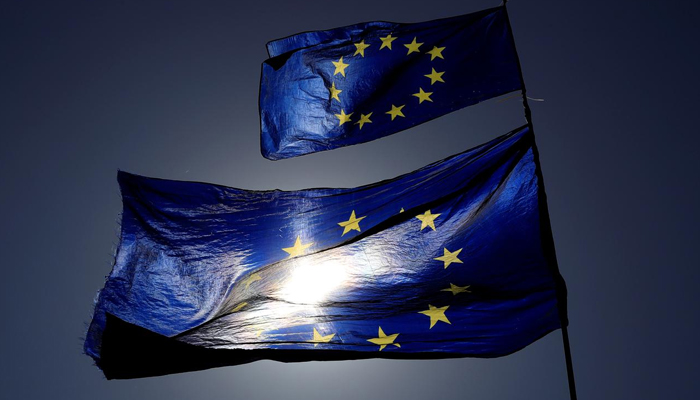EU economy shrinks by 3.5% in first quarter as result of coronavirus
Countries across the EU have drastically curtailed everyday life — and economic activity
April 30, 2020

BRUSSELS: The EU economy shrank by 3.5% in the first quarter, official data showed Thursday, the first major indication of the devastation facing the bloc as a result of coronavirus.
As lockdown measures imposed from March began to bite, the eurozone suffered an even bigger contraction — of 3.8% — in the first three months of the year, the EU's official statistics agency Eurostat said.
Countries across the EU have drastically curtailed everyday life — and economic activity — in a bid to slow the spread of COVID-19, which has killed more than 135,000 people across Europe.
Eurostat said it was the sharpest quarter-on-quarter drop in gross domestic product since it began compiling the figures in 1995.
The EU's Economic Affairs Commissioner Paolo Gentiloni said the devastating figures should spur the bloc's bickering leaders to approve a recovery plan big enough to be effective.
"The preliminary flash for euro area and EU GDP is a further indication that Europe is experiencing an economic shock without precedent in modern times," he said. "It is vital that the EU rise to this challenge."
Bert Colijn, a senior economist at ING bank, said the decline was the worst for the bloc since "at least the start of the 1970s" and warned there was probably worse to come.
"This time it really is different, a recession like the one we're currently in is unprecedented," Colijn wrote in a commentary, noting that the lockdown will have an even greater impact on the coming quarter.
Andrew Kenningham, chief Europe economist with Capital Economics, echoed this pessimism.
He predicted a "much bigger fall in activity in Q2, when the full lockdowns will be in effect for almost half the time and will then be only partially lifted".
Blizzard of woe
Compared with the same period last year, GDP was down 2.7% across the EU and 3.3% in the 19-member single currency zone — the biggest declines since the height of the global financial crisis in 2009.
There was more bad news on the inflation front, with consumer prices rising by just 0.4% in April compared with 0.7 % the previous month, driven by the collapse in energy prices.
The European Central Bank calculates that inflation rates of close to but just below 2.0% over the medium term are conducive to sustainable economic growth. And unemployment rose in March too, to 7.4 percent in the eurozone and 6.6% in the EU as a whole.
The grim EU figures came amid a litany of national woe around the bloc.
France officially fell into recession on Thursday, announcing a staggering 5.8% contraction in the first quarter — the worst performance since the national statistics agency began recording data in 1949.
In Spain — the eurozone's fourth-largest economy and one of the worst-affected countries by the virus — GDP shrank by 5.2%.
Even normally stable Germany, Europe's economic engine room, had its share of misery on Thursday as the jobless total soared from 2.3 million in March to 2.6 million in April.











